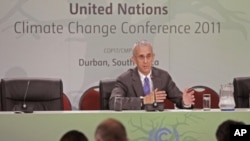The European Union says it is optimistic negotiators at the U.N. climate conference in South Africa will reach agreement on plans for future emissions cuts. Delegates expect to continue working on the details up until the final hours.
On the second-to-last day of the COP17 climate conference in Durban, delegates are focused on finalizing the details of a so-called EU 'road map'.
The plan would guide future negotiations on a global framework for cutting carbon emissions - something like the Kyoto Protocol which was implemented in 2007 and expires next year.
EU climate spokesman Isaac Valero told VOA there is growing support for the EU road map, but that some items need to be sorted out.
“Now, of course we have to look at all the different details, when the negotiations should be concluded," said Valero. "You know that the EU's position is very clear on this: we want the negotiations to be concluded by 2015 at the latest, we don't understand for the delays, and we want this new legally binding framework to apply to all major economies no later than 2020.”
Valero said he is optimistic that a deal will be reached by Friday.
The United States has also announced its support for the EU road map process.
“If we get the kind of roadmap that countries have called for, that the EU has called for, that the U.S. supports, for preparing for and negotiating a future regime, whether it ends up being legally binding or not we don't know yet, but we are strongly committed to a promptly starting process to moving forward.” said Todd Stern, the head of the U.S. delegation.
Environmental groups represented at COP17 have accused the United States of holding up progress on a binding deal.
Annie Petsonk of the Environmental Defense Fund said if the United States will not take action, it should get out of the way.
“The reluctance of the United States at this time to launch negotiations on a legally-binding protocol should not block the rest of the parties who are here who want to move ahead,” said Petsonk.
An American student from a U.S. youth group interrupted Stern's speech to delegates Thursday. Abigail Borah shouted that 2020 is too late for a legally binding treaty. She was referring to the U.S. stated position that it does not expect to enter any new agreement on emissions cuts until after that year.
Stern deflected the criticism at a later press conference, saying it is “completely off-base” to suggest the U.S. is proposing to delay action until 2020.
He said the U.S. is committed to emissions targets reached at the previous climate conference in Cancun, Mexico.
“It's not a time-out. I mean, it's not remotely a time-out," said Stern. "We reached an important agreement last year. We reached an agreement which, although it is not legally binding, it is a COP decision under a legally binding treaty which is very serious and which covers more than 80 percent of global emissions as compared to a Kyoto agreement which people are hoping will cover something in the order of 15 percent this year.”
The second-biggest issue yet to be resolved in Durban are the details of a Green Climate Fund. The project, hatched in Cancun, would finance climate-sustainable projects as part of a $100 billion plan to help developing nations.
The conference is scheduled to come to a close on Friday, though many people here expect negotiations to stretch late into the night.




